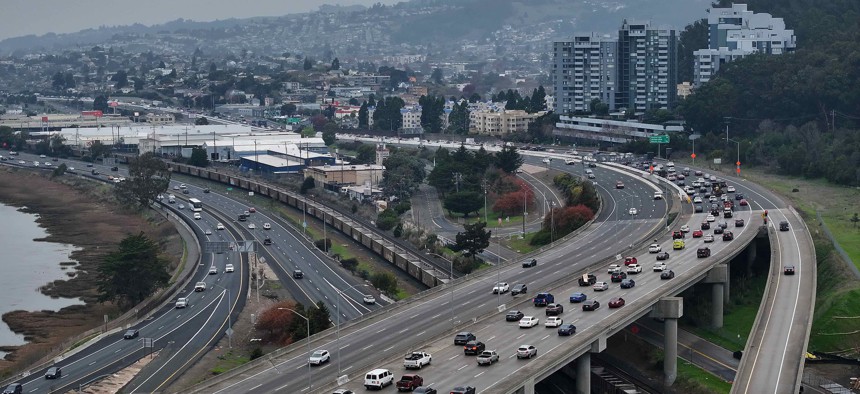Senate rebukes Biden administration on effort to reduce vehicle pollution

Vehicles travel along Interstate 80 in Berkeley, California, in January. Justin Sullivan/Getty Images
Three Democrats and one independent joined the chamber’s Republicans, arguing the Federal Highway Administration overstepped its authority in requiring states to track greenhouse gas emissions. But the president threatened to veto the measure.
Despite a veto threat, the Democratically controlled U.S. Senate passed a measure Wednesday that would limit the federal government’s ability to track carbon dioxide pollution generated on the highways it pays to build.
Three Democrats and one independent backed the measure, along with all of the chamber’s Republicans. The supporters included two Democrats facing tough reelection bids in November—Sherrod Brown of Ohio and Jon Tester of Montana—as well as Sen. Kyrsten Sinema, an independent from Arizona, and Sen. Joe Manchin, a Democrat from West Virginia, who have both frequently worked with Republicans on issues and have each announced they are not seeking reelection this fall.
The proposal would block a rule the Federal Highway Administration issued in November that requires state transportation departments and metropolitan planning organizations to track the carbon dioxide vehicles produce on their roads. The rule also instructs those agencies to make a plan to reduce CO2 pollution, although there is no penalty for not doing so.
The transportation industry is the biggest source of greenhouse gas emissions in the U.S., accounting for 28% of the country’s output.
Opponents of the rule argue the FHWA overstepped its authority.
“Few things are more frustrating in government than unelected bureaucrats asserting authority they don’t have and foisting federal mediocrity on the excellence of states,” said U.S. Sen. Kevin Cramer, a North Dakota Republican.
“They argued that since Congress was aware of their plans to promulgate this rule, and did not explicitly bar it, ‘Congress intended to leave such determinations to agency expertise to be handled via regulatory authority.’ That's not just arrogance, that is arrogance on steroids,” Cramer added. “The Biden administration should have never introduced this rule. But now we, the policymaking branch of government, must end it.”
The White House warned, though, that President Joe Biden would veto the measure if it passed the Republican-controlled House.
The legislation, it said, would remove “a common-sense, good-government tool for transparently managing transportation-related [greenhouse gas] emissions and informing transportation investment decisions.”
“If enacted, [the resolution] would make it harder for state and local transportation authorities and the public to access nationally consistent and transparent data about transportation-related GHG emissions—making their transportation decisions less transparent and less informed,” the White House added.
U.S. Sen. Tom Carper, a Delaware Democrat, also urged his colleagues to vote against the proposal.
“We are confronted almost daily by signs that our planet is literally on fire, and as the days and weeks pass, the urgency to act only grows stronger,” he said. “The cars, the trucks, the buses driven on our highway every day are a major source of emissions that are warming this planet.”
“It is simply not possible to meet our climate goals without addressing emissions from our transportation sector,” he said.
Carper, who chairs the Environment and Public Works Committee, said the FHWA proposal relied on a law passed in 2012 to monitor CO2, just as it does for other performance metrics, including safety, congestion and environmental sustainability.
“The rule does not take a one-size-fits all approach,” he said. “Instead, it gives each state the flexibility to set its own reduction targets.”
He stressed that states would not get punished for missing the targets they set. In fact, Carper said, the 2021 infrastructure law included funding for states to help them reduce CO2 emissions.
This week’s vote marks the latest chapter in a fight that stretches back to the Obama administration, which proposed a similar rule before the Trump administration rescinded it.
More recently, two federal judges in separate cases brought by Republican state attorneys general declared the rule illegal.
“If the [FHWA] Administrator were allowed to shove national greenhouse gas policy into the mouths of uncooperative state Departments of Transportation, this would corrupt the separation of sovereigns central to our lasting and vibrant system of federalism. Neither the Constitution nor the Administrative Procedure Act authorizes administrative ventriloquism,” wrote Judge Benjamin Beaton, a federal trial judge in Louisville, in a case brought by 21 GOP attorneys general.
But Beaton, a Trump nominee, declined to stop the Biden administration from enforcing the rule, noting that a federal judge in Texas had already issued an order to do that. Beaton said the dueling cases illustrated “the problem with universal remedies.”
In the Texas case, Judge James Wesley Hendrix sided with the Texas attorney general. “An agency cannot make this decision for the people. An agency can only do what the people authorize it to do,” he ruled.
Daniel C. Vock is a senior reporter for Route Fifty based in Washington, D.C.
NEXT STORY: ‘Valuable and largely overlooked:’ Interest in virtual power plants grows






